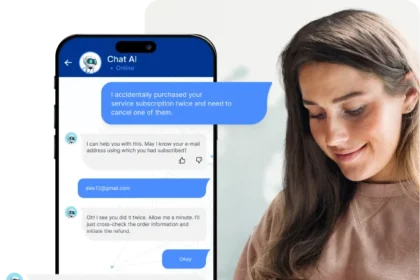Customer service just got a major upgrade—and it’s not human.
🤖 From Chatbots to Full-On AI Agents
Remember when chatbots could barely answer “What’s your return policy?” without glitching? Fast forward to 2025, and AI customer service has leveled up—big time. We’re talking about intelligent agents that not only respond but also anticipate needs, personalize interactions, and even resolve issues before you realize there’s a problem.
According to Zendesk, AI is projected to handle 95% of all customer interactions by 2025. This isn’t just about efficiency; it’s about transforming the customer experience into something faster, smarter, and surprisingly more human.
💡 Real-World Applications: Who’s Doing It Right?
🎧 Zurich Insurance’s AI-Powered CRM
Zurich Insurance has rolled out a new AI-driven customer relationship management system that’s been likened to “Spotify for insurance agents.” This platform centralizes customer data and uses AI to recommend the most suitable insurance products, reducing service times by over 70%.
🏀 SAS’s Viya Copilot
At the SAS Innovate 2025 event, SAS introduced Viya Copilot, an AI tool designed to assist in data modeling and decision-making processes. Companies like Orlando Magic and Procter & Gamble are already leveraging these tools to enhance their customer service strategies.
📣 What People Are Saying
Social media is buzzing with reactions to the AI customer service revolution:
- Reddit User: “I’ve been tinkering with a RAG-based chatbot that gives answers from our internal help docs. It will give the correct answer 9 out of 10 times.”
- TikTok Video: A user showcases how AI customer service bots are handling calls with remarkable efficiency, stating, “Experience how AI is revolutionizing customer service phone calls in call centers.”
📊 The Benefits: Why Businesses Are All In
- 24/7 Availability: AI doesn’t sleep, ensuring customers get assistance anytime.
- Cost Efficiency: Reduces the need for large customer service teams.
- Consistency: Provides uniform responses, minimizing human error.
- Scalability: Easily handles increased demand without compromising service quality.
⚠️ The Challenges: Not All Smooth Sailing
While the benefits are substantial, there are hurdles to overcome:
- Lack of Empathy: AI struggles with understanding nuanced human emotions.
- Data Privacy Concerns: Handling sensitive customer data requires stringent security measures.
- Over-Reliance: Dependence on AI can lead to issues if the system fails or provides incorrect information.
🔮 The Future: What’s Next for AI Customer Service?
The trajectory is clear: AI will continue to integrate deeper into customer service roles. However, the human touch remains irreplaceable for complex or emotionally charged interactions. The goal is a hybrid model where AI handles routine tasks, freeing human agents to tackle more intricate issues.
For more insights into how AI is reshaping industries, check out our article on AI co-workers: AI Co-Workers: Embracing Automation in the Workplace
❓ FAQ
Will AI replace human customer service representatives?
Not entirely. AI will handle routine inquiries, but human agents will still be essential for complex or sensitive issues.
Is AI customer service secure?
Yes, provided companies implement robust data protection measures and comply with privacy regulations.
Can AI understand and respond to emotions?
AI is improving in sentiment analysis but still lacks the depth of human emotional intelligence.
How can businesses implement AI in customer service?
Start with AI chatbots for common queries and gradually integrate more advanced AI tools as needed.









